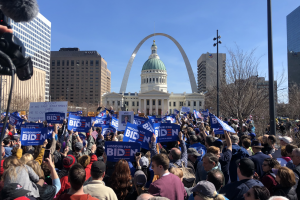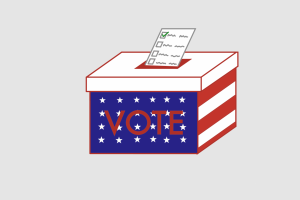Bernie Sanders is a danger to democracy
March 10, 2020
If I had the chance to vote on March 10 in Missouri’s primary, I would vote for former Vice President Joe Biden in a heartbeat. This is after attending both Biden’s and Senator Bernie Sanders’ St. Louis campaign rallies — and after a lot of consideration on my part in the last few months of the presidential race.
As a young woman, it’s probably surprising to hear me support Uncle Joe over Grandpa Bernie. Sanders advocates for zero student loan debt, free universal healthcare and for the expansion of Planned Parenthood funding. He has consistently voted in support of minority groups and has a history of social activism dating all the way back to the 1960s.
It’s not that I am against these policies — in fact, if they were to be implemented, it would make my life a lot easier. But, see, in elections of this nature — when we have someone like our current president in the Oval Office — specific policies don’t hold as much weight as Sanders’ supporters wish they did. My (hypothetical) vote for Biden over Sanders rests on two reasons.
First, the biggest problem in our democracy at the moment: polarization. At his campaign rally, Sanders spoke heavily of defeating Trump. He aims to increase young voter turnout in order to unseat “the most dangerous president in modern history,” Sanders said at the rally March 9. He spoke little of the destructive divisions currently in the Democratic party during his 45-minute speech; meanwhile, Biden spoke for seven minutes total at his rally March 7 and pushed a message of bipartisanship and unification.
The president is not the only power in the government. (Although it seems to be heading that way — I’ll get there.) Congress is vital to passing any proposed legislation — as any US Government & Politics student knows, only representatives, not the president, can introduce a bill. The Democratic National Committee (DNC) fears that a Sanders nomination would cause voters to “balance out” their Sanders vote with a Republican vote in Congress, since Sanders is far left.
Unfortunately, the political world we currently live in detests middle ground, which has been increased by our president and used to his advantage. His opponents are quick to condemn this, yet they are the same people hoisting Bernie 2020 signs. Democrats can’t point fingers at the White House and then nominate someone who will push the divide even further. Joe Biden has received criticism for being friendly with Mitch McConnell, Senate Majority Leader. However, this is exactly what we need: a nominee with connections on both sides, friends in the House and Senate — where Sanders is not well-liked among Senators from both parties — and a call to build a bridge, not burn one.
My second reason concerns the increasing power of the presidency. Since Franklin Delano Roosevelt and the New Deal of the 1930s, the executive branch has increased power to a dangerous level. Executive orders are extremely common and the idea of executive privilege, or the president withholding certain information from Congress, is accepted (thanks to Nixon). Moreover, succeeding presidents have operated by what historian Arthur Schlesinger calls the imperial presidency. Ford, Carter, Reagan, H.W. Bush, Clinton, Bush and Obama have all conducted extreme foreign affairs operatives without much Congressional oversight. And we now have a president that is gleefully building off the precedents set by his predecessors.
When Sanders discusses his big plans to reform item after item — college tuition, pharmaceutical companies, minimum wage, infrastructure, Social Security, taxing Wall Street, fossil fuel industry, private prisons,“strongest gun legislation ever proposed,” Planned Parenthood, immigration, to name a few — it begs the question: can the president really fix all of these problems? Will one vote for Sanders really enact change? Even if the answer is yes, and even if all of these come true, I wouldn’t want it to be possible.
If Sanders does get elected and is able to accomplish all of these actions, it gives a huge advantage to the next president, who will probably be a Republican because the United States will have had enough of Sanders’ democratic socialism. So where have we landed ourselves now? With a presidency capable of leaching into the roots of Congress, of the Supreme Court, of the people and the press. That is not a risk worth taking.






